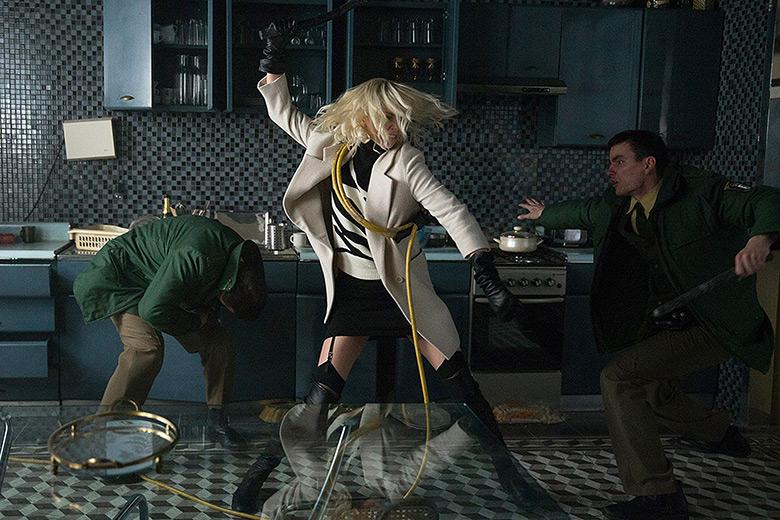David Leitch, a stuntman and actor who co-directed the puppy-avenging Keanu Reeves actioner John Wick, makes his solo feature film debut with Atomic Blonde, a hyperkinetic espionage tale set in Berlin in the last days before the fall of the wall. Charlize Theron, as an MI6 agent sent to the divided German city on an increasingly befuddling mission, provides the movie-star fuel that keeps this rickety contraption hurtling along. But unlike Imperator Furiosa, the single-minded rebel warrior Theron played in Mad Max: Fury Road, her Lorraine Broughton, a bleached-bob–rocking alpha female who chain-smokes her way through a grueling agency debriefing in the terse framing story, is given almost no back story at all.
This seems to be the preferred method, at the moment, for conveying an action-movie heroine’s bona fides: She must maintain a poker face at all times, betraying no details of any past experiences or set of internal values that might have placed her on this scumbag-eliminating path in the first place. Emily Blunt’s character in Sicario shared this quality of blank stoicism, as do Scarlett Johansson’s superspies in movies such as the Avengers films and Ghost in the Shell (to varying degrees, depending on whether or not they are actual robots). I suppose it’s a trait that male action heroes have exhibited forever, but is it really a step forward just to paste those expressionless masks onto more female faces?
Atomic Blonde was based on The Coldest City, a 2012 graphic novel by Antony Johnston and illustrated by Sam Hart. True to its origin, the film recalls the kablammo!-crammed panels of many comic books more than the moral fog of, say, John Le Carré novels and their film adaptations. Lorraine Broughton doesn’t do a lot of terse conversing on park benches or reminiscing about long-ago interrogations gone awry. When she isn’t being debriefed about her recent mission to Berlin by her MI6 superior (Toby Jones) and a CIA bigwig (John Goodman), she’s reliving those brutal days in flashback, starting with her introduction to David Percival (James McAvoy), the Berlin station chief for British intelligence. Lorraine and David’s working relationship is adversarial from the start and becomes more so as David’s true allegiances come into question.
Lorraine’s task in East Berlin is to find and bring back a copy of “the list”—a complete account of the names of Western agents in Soviet territory, if I understood this crucial yet muffled plot point correctly. One of the most reliable versions of this list exists only in the brain of a Stasi agent known as Spyglass (the fantastic actor and Mike Leigh favorite Eddie Marsan, almost completely wasted in a colorless and too-small role). In collaboration with the hard-partying and possibly traitorous Agent Percival, Lorraine must find a way to smuggle Spyglass—and his family, whom he insists on bringing along as part of the deal—out of heavily fortified and surveilled East Berlin.
Meanwhile, a slinky French agent (Sofia Boutella of Star Trek Beyond) quickly goes from tailing Lorraine to … nailing Lorraine, in a Jean-Jacques Beineix–worthy ’80s-style loft where ceiling-height scarlet draperies offset the scraped-down post-industrial walls. Like the sets, the soundtrack refuses to let us forget for a moment what decade we’re in, leaping confidently if sometimes distractingly from Queen and David Bowie’s “Under Pressure” to Flock of Seagulls’ “I Ran” to the German songstress Nena’s anti–Cold War hit “99 Luftballons.”
The shifting interpersonal and international alliances that normally provide the meat of spy dramas barely figure into the concerns of Atomic Blonde. Lorraine’s cloak-and-dagger exploits are mostly an excuse to watch Theron looking buff and battle-worn (but in a hot way—she has a world-class cheek-abrasion stylist) as she strides through the heavily graffitied streets of East Berlin in long white coats and red stiletto heels. Occasionally she’ll pause for a dalliance with that lissome French lover, whose presence in the movie is more a side dish of eye candy than a breakthrough for lesbian visibility on screen.
In the longest, best-choreographed, and most memorable sequence (filmed to look like a several-minutes-long take, though there must be hidden cuts), Lorraine fights her way up several floors of an apartment building stairwell, single-handedly inflicting dire harm on what seems like an unending stream of burly louts. Along the way she keeps finding and discarding creative new weapons, at one point beaning an opponent with a two-burner portable stove. This scene demonstrates little about her character that we didn’t already know: She’s strong. We get it. Still, there’s a primal pleasure in watching this invincible Amazon arise from each apparently terminal male beatdown to face and survive the next. (I do wish, though, that the director would ease up on the “speed-ramping” slo-mo effect that’s already been done to death in the graphic-novel–based films of Zack Snyder.)
If watching Charlize Theron kick a truckload of Soviet-sympathizing ass sounds to you like a fine Saturday night at the movies, then go see Atomic Blonde and enjoy. This frenetic if unambitious thriller aspires to little more than to offer its viewers slightly under two hours of bone-cracking, babe-ogling fun (and among those babes I include McAvoy, playing a rawer, more dangerous character than his customary emo naïf). For myself, I will say that the particular kind of “fun” to be found in a slick and shallow spy fantasy like Atomic Blonde feels peculiarly arid in a moment as desperate for substance and meaning as our own. There are real spies in the world pulling even harder-to-follow international scams than this, and the only unstoppable blonde in sight seems unlikely to intervene on the good guys’ behalf.
